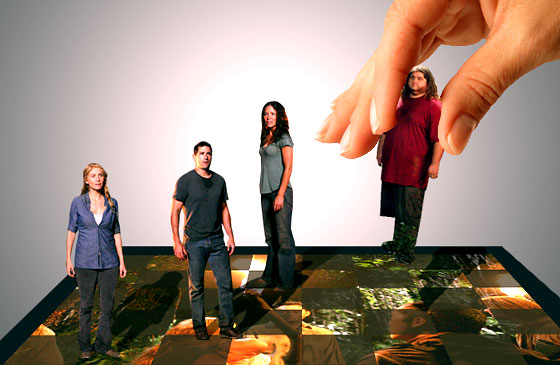Nussbaum: Why ‘Lost’ Is the Best Game Show in TV History

Photo illustration: Everett Bogue; Photos: Courtesy of ABC; iStockphoto
Elsewhere in Vulture's Lost finale coverage:
‘Lost’ Season-Finale Recap: A Real Humdinger!
Vulture’s Exclusive Season-Five Preview
Who Called Kate on the Phone?
What Is Octagon Global Recruiting?
Was That the Psychic?
See the Alternate Endings
Hasn't Lost been great this season? Thrilling, funny, sexy, shocking! After the crisis of last season, when the show risked losing an audience frustrated with all the unanswered questions, it's impressive to see its creators unfold its plot so skillfully. Just imagine facing the angry, sweaty, paranoiac pressure from Lost's vocal fan base: All those snarky recaps, all those wails of shark-jumping, all those slash montages of Sayid cheating on Michael with Desmond! It's got to feel a bit like brainstorming episodes naked, onstage, at a Trek convention.
And yet, the writers keep upping the ante. Their brassiest move came in the finale of last season, when they effectively blew out the front door of their own narrative spaceship, revealing — in that eerie final sequence when Kate and Jack met at an airplane hangar — that what we'd thought was a flashback was actually a flash-forward. It was the equivalent of a perfect arabesque; like they were showing off how much power they have over us.
The flash-forward was one of those splashy TV moments, like Kimberly pulling off her wig in Melrose Place. But it's paid off as more than just a gimmick.
That single shift flipped the Lost game board out fifteen squares in each direction. It expanded the show's setting from the island to the world. It raised the level of narrative difficulty, both for the writers and for the fans, pivoting elegantly away from "Will these people get off the island?" and complicating the whole notion of "What will happen next?" (And I'm not even getting into the whole time-travel thing.)
But best of all, it made the show's appeal weirdly clear: that this is as much a game as a story. It's no surprise I find myself talking about the level of difficulty; it feels very much like we're leveling up. My husband, who is a video-game critic, pointed out that Lost online commentary often feels less like a response to a story and more like the way fans deconstruct an ARG, an alternative reality game, participating in communal puzzle-solving and focusing obsessively on tiny details. Some of this is deliberate, of course. Lost has had its own video game and ARGs (The Lost Experience and Find 815); co-creator Damon Lindelof has talked about the influence of Myst. But it was a little bit of a shock to me, a traditional narrative nerd, to realize that what was kicking my ass was the game play, not the deep thoughts.
Because Lost is a brilliant TV show, but it's not brilliant the way our culture usually defines that quality — it's not "Dickensian." It's thought-provoking, but the themes are not always complex; with a few exceptions (for me, Locke and Ben), it has compelling characters, but they have motivations, not true inner lives. Yet if there's one thing this excellent season has demonstrated, it's that a TV show doesn't have to be like a literary novel to be genuinely ambitious. Lost feels a bit like a detective story and a lot like a comic book, but even more like a video game, with some of the pleasures of sci-fi, and definite aspects of a magic show. It's a new kind of tour de force.
Its tricks are tricks of puzzle and chronology — showman's tricks, rhythmic revelations that can lead to real emotional release (Penny and Desmond's phone call at last!) but are more centrally about the mathematical shock of watching two elements slip into unexpected relationship (like the realization that Desmond's "incident" is what caused the plane to crash). The series has always rewarded near-schizophrenic levels of pattern recognition, to such an extent that it can distort my other TV watching (does anyone else watch The Wire expecting license-plate numbers to reveal hidden clues?). But the most original aspect to Lost is the sure-handed way its creators have dovetailed the satisfactions of a story with the payoffs of a game.
And maybe this isn't just a coincidence. After all, board games have taken up a striking amount of space this season. There's Locke with his backgammon; there's Hurley's Connect Four; there was that suggestive, meta-conversation over a game of Risk. And Ben did complain mysteriously about Widmore's "changing the rules": Could the whole thing be a game? Excuse me, I'm off to consult Lostpedia and figure it all out before the finale… —Emily Nussbaum
No comments:
Post a Comment